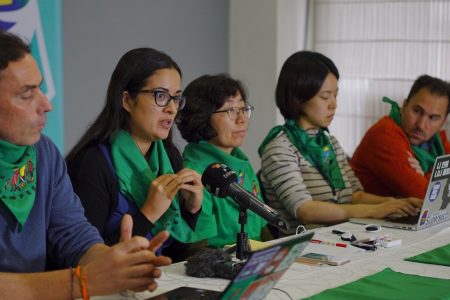After travelling through the territories of Cauca, Tolima and Sumapaz in Colombia, La Vía Campesina delegates verified that there is “lack of compliance with the implementation of the points included in the Peace Accords (signed between FARC and the government) and a general questioning about the accords and the peace process” by representatives of Iván Duque´s administration.
“We´ve experienced, lived and heard the will of the Colombian people, in peasant sectors, to continue working towards the peace process in the country”, said Federico Pacheco of Vía Campesina Europe at the press conference held on Tuesday, April 2nd. This activity closed the 3rd International Solidarity Mission to Colombia of Vía Campesina.
LVC delegates met with authorities, MPs and peasant communities to learn about how the Peace Accords signed in Havana, Cuba, in 2016, are being implemented.
They warned that the Colombian president´s rejection to the Special Justice for Peace “is something serious”, which is “putting the peace process at risk by not respecting human rights institutions and the international rights protection systems of the United Nations”.
Pacheco said: “We have confirmed that there is criminalization of the former fighters of FARC, who surrendered weapons two years ago and are building a local peasant economy, an economy that needs support and budget in order to grow”.
In addition to Pacheco, the following people participated in the conference: Kim Jeong Yeol Kim – Korean Women Peasant Association, María José Venancio – National Indigenous Peasant Movement (MNCI Argentina) and Diego Montón – Latin American Coordination of Countryside Organizations (CLOC).
Kim Jeong Yeol Kim highlighted the importance of visiting the territories and speaking firsthand with the peasants who struggle to build peace in Colombia. “Millions of murders, disappearances and imprisonments took place here. We will never forget. It is key to organize international efforts to make demands to the Colombian government, since we do not trust that the government really wants to implement the Peace Accords”, said the Korean leader.
About the land conflict, the delegates stated that they don´t see enough advances “due to the lack of a clear policy in support of peasant economy”. “The government continues promoting an agrarian model that fosters land grabbing, extractivism and agribusiness”, added to the fact that “there isn´t any ongoing mechanism to distribute the 500 thousand hectares in the land distribution plan”. They also denounced that crops continue to be sprayed with glyphosate.
María José Venancio highlighted that they received reports of over 400 defenders of territories murdered since the Peace Accords were signed, and that 300 former members of FARC are detained.
“There are no excuses: the State has the main responsibility for the crimes and human rights violations after the signing of the Peace Accords. We demand the Colombian State to investigate in order to know the truth about the murder of social activists. With these many murders, the State and the agencies created to follow up the issue are evidently not working”, said Venancio. And she concluded: “The Accords must be respected, not only as an instrument for peace in Colombia, but for all humankind”.
“We truly believe that peace is a fundamental need in the region and the world. And as the Declaration on Peasant Rights states, social justice is very difficult without agrarian reform that ensures access to land. Hopefully, the Colombian State will recognize social justice and agrarian reform as requirements to achieve peace”, added Diego Montón.
